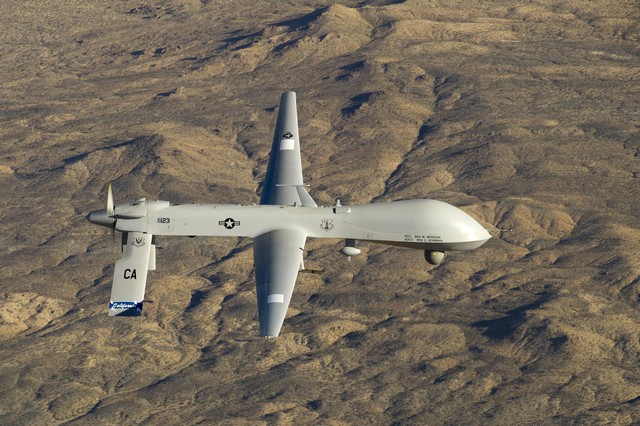By Charles Pierson
A criminal court in Pakistan has indicted two US officials for their connection with US drone strikes. They are Jonathan Banks, former CIA station chief in Pakistan, and John A. Rizzo who in 2009 was the CIA’s acting general counsel overseeing the agency’s drone program.
Anti-drone activists rejoiced over the April 7 indictments. Here, activists believed, the US was finally being held accountable for its murderous and illegal drone strikes. But how is this accountability when it’s obvious that Banks and Rizzo will never stand trial?
Banks left Pakistan in a hurry in late 2010 after being outed as CIA station chief in Islamabad by Shahzad Akbar, a Pakistani human rights lawyer who represents the families of victims of US drone strikes. At that time, Akbar named Banks as defendant in a $500 million lawsuit for wrongful death brought by Karim Khan, a journalist in North Waziristan. Khan’s brother and son had been killed in a CIA drone strike. Khan’s brother had been a schoolteacher who had continued to teach despite receiving threats from the Taliban. Pakistan’s powerful Inter-Services Intelligence denied having leaked Banks’ identity.
If the US wanted Rizzo and Banks prosecuted we could do it ourselves. We have the means. US drone strikes in Pakistan are unsanctioned by international humanitarian law because the United States is not engaged in an armed conflict with Pakistan; drones do not distinguish between civilians and combatants; and the staggering number of civilian deaths is vastly disproportionate in relation to the numbers of Taliban and Al-Qaeda killed. This qualifies drone strikes as “grave breaches” of the Geneva Conventions punishable under the US War Crimes Act. Since the US has decided not to prosecute Banks and Rizzo why should anyone believe the US will allow Pakistan to prosecute them?
The US doesn’t punish officials complicit in war crimes: we promote them. John Brennan had been President Obama’s counterterrorism czar. Brennan and Obama met each “Terror Tuesday” (the macabre designation used in the White House) to select new individuals as drone targets. In 2013, President Obama rewarded Brennan with promotion to CIA Director. David Barron, a Justice Department lawyer who drafted memos providing legal cover for drone hits, is now a US federal judge. And let’s not overlook President Obama himself. Obama has launched far more drone strikes than did President Bush. Rather than being punished by the American electorate, President Obama was easily re-elected in 2012.
Pakistan has long protested US drone strikes on its territory. US drone strikes on Pakistan’s remote tribal areas began in 2004 and have killed between 421 and 960 civilians, according to the independent British-based Bureau of Investigative Journalism.
Pakistan doesn’t seem to mind drones in general, just US drones. On March 13, Pakistan announced that it had developed its own armed drone called the Burraq (the white horse which in the Koran carried the Prophet to Heaven).
But perhaps Pakistan will use drones more humanely than the US? Don’t count on it. All but two US drone strikes have taken place in Pakistan’s Federally Administered Tribal Areas (FATA). (The other two strikes took place in neighboring Khyber-Pakhtunkhwa Province.) Islamabad has absolutely no concern for the rights or well-being of the inhabitants of the tribal areas. Islamabad treats FATA like a colonial possession. The protections of Pakistan’s Constitution (such as they are) do not extend to FATA. Instead, the “tribals” are governed by the draconian Frontier Crimes Regulation put in place by the British in 1901. Each of the seven tribal agencies is governed by a “Political Agent” selected by Islamabad with no input from the tribals. The Political Agent rules with unfettered, largely unappealable authority.
The Pakistan Army’s current campaign in FATA’s North Waziristan has driven nearly a million Waziris from their homes. The Pakistan Army is responsible for disappearances, unlawful detention, bombardment of villages, and extrajudicial killings of civilians. And the Army may not be fully committed to eradicating militants. Pakistan has maintained ties with Islamic militants since its creation in 1947, seeing them as a tool for maintaining “strategic depth” in Afghanistan against India. Last year, the Pakistan Army pledged that it will no longer draw a distinction between “good” Taliban and “bad” Taliban. Yet the United States believes that the Pakistan Army tipped off the Taliban-linked Haqqani Network prior to the invasion. (Pakistan does not view the Haqqani Network as a threat because it does not attack the Pakistani state. The Haqqanis do attack American forces in Afghanistan.)
Pakistan did not exactly burnish its anti-militant credentials when on Friday it released Zakiur Rehman Lakhvi on bail. Lakhvi, a member of the terrorist group Lashkar-e-Taiba, faces trial as the alleged mastermind of the 2008 Mumbai attacks which left 166 people, including six Americans, dead. Pakistan’s ISI is widely believed to have assisted LeT in planning the attacks. Hafiz Saeed, LeT’s leader, lives openly and unmolested in Lahore, Pakistan.
Pakistan isn’t the first country to use militants as proxy forces: the United States did the same thing in Afghanistan in the 1980s and currently aids militants in Syria against the Assad regime.
For now, let’s concentrate on ending the US contribution to the violence in Pakistan. Step one is to face reality. Let’s not congratulate ourselves on imaginary victories such as unenforceable indictments. Had Pakistan arrested the CIA’s current station chief that would have been worth celebrating. Accountability will begin only when Bush, Obama, Brennan, Banks, Rizzo, and all their accomplices stand in the dock. Then will be the time to celebrate.
Charles Pierson is a lawyer and a member of the Pittsburgh Anti-Drone Warfare Coalition.

